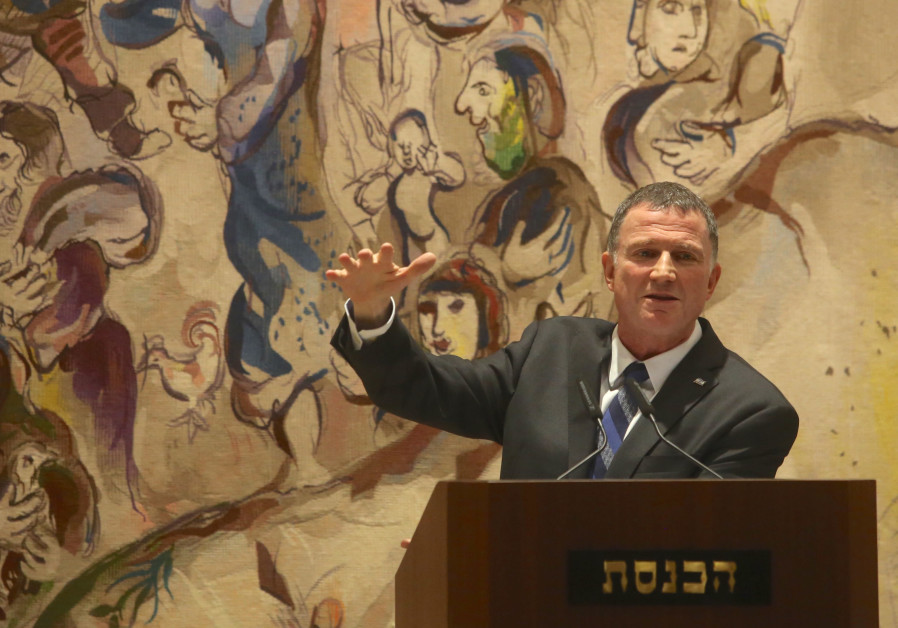Katz, Edelstein neck-and-neck for first place, 70% of Likud votes counted

Knesset Speaker Yuli Edelstein speaking at the Knesset, October 23, 2018. (photo credit: MARC ISRAEL SELLEM/THE JERUSALEM POST)
Transportation Minister Israel Katz was in first place with Knesset Speaker Yuli Edelstein behind by only 175 votes in the Likud primary, as about 70% of the votes were counted Wednesday morning.
Prime Minister Benjamin Netanyahu will be first on the list for the Knesset.
Netanyahu’s rival, former Likud minister Gideon Sa’ar, came in third place, despite the premier’s best efforts to convince party members not to vote for him.
Rounding out the top five are Public Security Minister Gilad Erdan, followed by Culture Minister Miri Regev.
Netanyahu is likely to disregard placement on the list when giving out ministerial portfolios within his party, rewarding loyalists. However, placement on the list is an indication of popularity in the Likud, which could signal who will eventually replace Netanyahu.
The rest of the top 10 were former Jerusalem mayor Nir Barkat, Tourism Minister Yariv Levin, Immigration Absorption Minister Yoav Gallant, Social Equality Minister Gila Gamliel and Knesset Foreign Affairs and Defense Committee chairman Avi Dichter.
Polls closed in 113 locations across the country at 10 p.m. on Tuesday night with 69,719 out of over 120,000 eligible Likud members, a turnout of 58%. This is an increase compared with the previous primary in 2015, in which only 52% eligible members voted, and there has also been a significant increase in the number of Likud members.
Early results from the Likud Primaries showed that Prime Minister Benjamin Netanyahu’s rival, Gideon Sa’ar, together with Knesset Speaker Yuli Edelstein were leading in the race.
By 4 a.m. on Wednesday, some 20% of the vote had been counted. Results showed that Edelstein had so far clinched top spot followed closely by Sa’ar, Transport Minister Yisrael Katz, Public Security Minister Gilad Erdan, and Sport and Culture Minister Miri Regev. Former Jerusalem mayor Nir Barkat as well as Aliyah and Integration Minister Yoav Gallant also made it into the top ten.
Gallant was appointed to the position in January following his defection from Kulanu to Likud.
A partial count of the polling stations in Tel Aviv showed that Yuli Edelstein is currently leading. The leading players in Ramat Gan are Yoav Galant, Israel Katz and Yoav Gamliel.
In Tekoa, Prime Minister Benjamin Netanyahu’s major rival, Gideon Sa’ar was leading, together with Yariv Levin and Yisrael Katz.
Results for the Likud Primaries are expected to be released early on Wednesday morning.
Jerusalem saw a voter turnout of 5,685 out of over 10,000 voters in the city, while Tel Aviv only saw 6,491 voters out of 11, 656 party members, which is lower than in previous years. The highest turnouts were in the Shfela region, the Galil and the Negev.
Polls were closed at 10 p.m. on Tuesday night. Among the 120,000 Likud voters, 69,719 members of the party voted in total.
The final turnout was 58%. This is an increase compared with the previous primaries, In 2015, only 52% of Likud party members voted in the primaries. Likudniks had voted at 113 polling stations across the country.
Join Jerusalem Post Premium Plus now for just $5 and upgrade your experience with an ads-free website and exclusive content. Click here>>






Comments are closed.